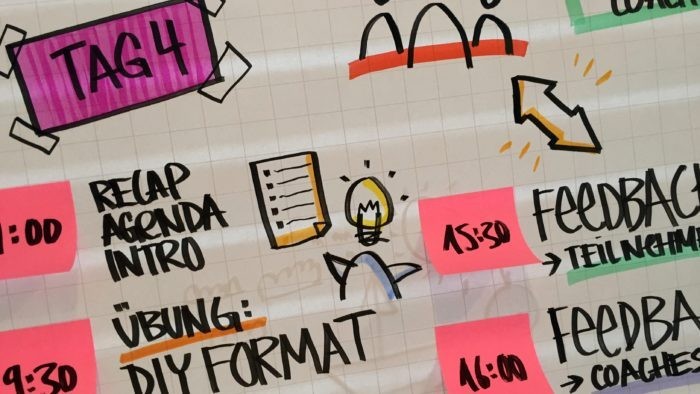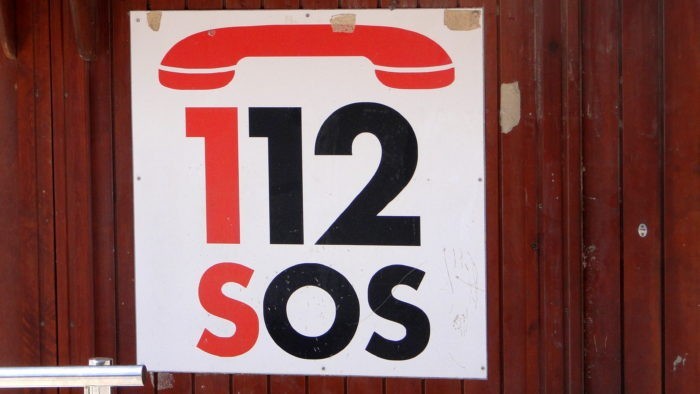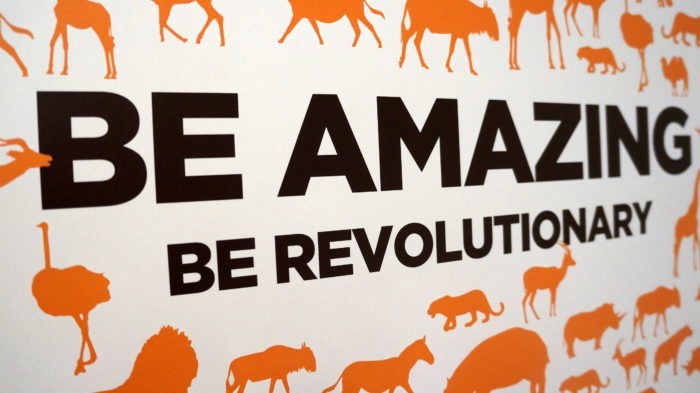your journey
Ten Design Thinking Workshop Principles – Part 4
As described in the first, second and third article of this small series, I would like to describe ten Design Thinking workshop principles that have become essential for me, based on well over 200 shorter and longer formats, which I have designed and implemented in the last few years for a wide range of topics, challenges, participant groups and (business) contexts.
For me, these principles have become an orientation and guideline for every newly developed format:
- Start with the people
- Integrate the whole human being
- Experience comes first
- Conscious working
- Pause and reflect
- Step by step
- Endure uncertainty
- Perfect preparation
- Let go
- Be a role model
I do not want these principles to be understood as strict rules that have to be applied only in the described way. I see them more as an inspiration to develop your “own” principles and to integrate them in the very own and personal way in which you plan, prepare and carry out Design Thinking formats.
In the following I will describe the last three principles, the others are described in the other articles of this small series.
Principle 8: Perfect preparation

“Proper planning and preparation prevents poor performance. “- Stephen Keague
“In preparing for battle, I have always found that plans are useless, but planning is indispensable.” – Dwight D. Eisenhower
Ultimately, there is no guarantee for the success of a Design Thinking format. Nevertheless, an intensive and best possible preparation is important and necessary for different reasons.
On the one hand, a clear understanding and discussion of the agenda help me during the preparation phase. I never plan in time blocks shorter than 15 minutes and that has always worked quite well.
In addition to the agenda, I usually spend a lot of time adjusting the templates I use. I always try to adapt them to the specific format, the topic or the group of participants.
It should be self-evident that only German documents will be used for a German-speaking group, and that the English version will be used for English-speaking participants.
Furthermore, I believe that an appropriate preparation includes a substantive agreement with the client regarding the problem to be worked on and the expectations of the event in general. Of course, the user group addressed in the planned questionnaire should also be present during the workshop. If possible, I also like to perform a pre-screening of the workshop space or prepare the room on the evening before the workshop itself.
An appropriate preparation is also beneficial in dealing with participants, because they usually notice quite quickly, whether you are well-prepared as a coach or moderator and how much effort you have put into the templates or slides or the entire preparation. Most of the time, participants reward a good preparation with active and interested co-operation – that is at least my experience.
Principle 9: Letting go

“You don’t always need a plan. Sometimes you just need to breathe, trust, let go, and see what happens.” – Mandy Hale
“Stop overthinking. You can’t control everything, just let it be.” – Unknown
As described in the last section, I consider good preparation as crucial to any Design Thinking format. But what should you do when everything goes wrong and the workshop day turns out completely differently than what had been planned before? In that case, the challenge for me as coach is just to let go and “go with the flow”.
This may seem obvious at first, but from my experience it can be a real challenge for all parties involved. Sometimes a coach has invested several days or weeks to prepare a format, a precisely planned agenda or perfectly designed templates and everything should work perfectly in theory – then his feelings can easily turn personal and lead to him thinking that the workshop is “his baby”. In that case, he might think that participants should stick to his planning at all costs and “better be happy about it”.
I remember a workshop with a company that produces lighting systems, where, during the synthesis, the motivated and curious participants did not want to use my suggested methods in the manner I had imagined. Luckily, I had a very experienced colleague in Yvonne, who could look at the situation in a much “soberer” way than I was able to at the moment. She really helped me with her feedback and her perception of how “good” or “bad” the methods worked out and aided me in letting go of my “plan” and instead work with what had emerged.
Intensive exchanges with other coaches, ideally during a workshop day, are in my opinion the best way to deal with unforeseen things. A non-judgmental look at yourself can also be exciting and meaningful. Perhaps it is my own high expectation for the success of the workshop that puts me under stress in “case of fire”?
Principle 10: Be a role model

“Be the change you want to see in the world.” – Mahatma Ghandi
“Example is leadership.” – Albert Schweizer
The last principle I would like to mention is not really a principle, but more of a call to action.
As a Design Thinking coach, it is my job to help organizations, companies or teams with various Design Thinking formats in order to establish the much-cited innovation culture. Therefore, I must, in my opinion, also follow my own words and act as a role model to the participants.
I am the first person to be in the workshop room in the morning and the last one to turn off the lights at the end of the day (literally!). I approach each participant openly, curiously and without bias. I question the status quo and am not afraid to do things “differently”. Even if, and especially if, there is resistance. At the same time, I always have an open ear for feedback from the participants or other stakeholders, and react on it whenever possible. Furthermore, I stand up for the convictions, that are important to me in a workshop or project, and, if necessary, start a constructive confrontation with the participants or other stakeholders.
I see myself as part of the team, without taking on the team’s work. I do not expect myself to be always successful and I believe that failures can be a good way to learn and to improve myself.
I live by the values that I preach and preach only the values that I live. I am always authentic and take responsibility for myself and my actions.
And I have fun doing it.
Share this:

Neil ran his first SAP transformation programme in his early twenties. He spent the next 21 years working both client side and for various consultancies running numerous SAP programmes. After successfully completing over 15 full lifecycles he took a senior leadership/board position and his work moved onto creating the same success for others.